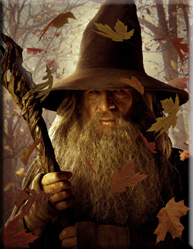Magic is
prevalent in fantasy fiction; and without it, fantasy does not exist. Mainly, magic
is willed in the countless tales and books of fantasy by the likes of wizards,
magicians, sorcerers, mages, druids, witches, and other types of characters. Wizard
is the name mostly used in fantasy stories for a practitioner of magic (mostly
male). Famous wizards in literature, such as Merlin, Gandalf and Harry Potter,
have kept the wizard tradition alive and strong.
Traditionally,
wizards have been depicted as tall, old and often bearded, in the likes of
Merlin (Arthurian legend), Gandalf (Lord of the Rings), Allanon (Shannara
Trilogy), and (beardless) Zedd (Wizard’s First Rule). However, the latest
popular wizards like Harry Potter, Harry Dresden and Atticus O’Sullivan (The
Iron Druid Chronicles) sport entirely more modern images.
Merlin is
likely the most famous and most adapted of the wizards, spawned from Geoffrey
of Monmouth’s 12TH century pseudo-history books, Historia Regum
Britanniae; and later embellished by poet Robert de Boron, and many others
afterward. From the original folklore, Merlin comes into being when an incubus
(a demon in male form) impregnates a king’s daughter, which is why he has magic
abilities. Robert de Boron’s version of Merlin’s story adds that Merlin’s
mother has him baptized at birth, which liberates him from the power of Satan.
Later tales formed the Merlin that we are accustomed to today—with him being
the wizard advisor to King Arthur.
The wizards
of Middle-earth are the Maiar, who were sent into creation by the (angelic) Valar
to assist the elves and men of Middle-earth in contending with the dark lord, Sauron.
Five wizards were sent, with Saruman the white as their chief. Gandalf the grey
and Radagast the brown are the other two wizards that we are familiar with in
Tolkien’s four books; but the “Blue Wizards”, Alatar and Pallando, are only
mentioned in the Unfinished Tales
edited by Christopher Tolkien.
Most other
wizards in the genre do not hold such supernatural origins like the ones
mentioned above. They’re generally people practicing the craft of magic, or
inborn with the gift of it. Harry Potter had to become a student at Hogwarts
School of Witchcraft and Wizardry to learn his magic abilities, even though his
parents were wizards, but were killed when he was a baby. Harry Dresden had a
wizard for a mother and a magician for a father; and he used his abilities to
do his detective work. Kvothe (from the Kingkiller Chronicle) is not your
typical wizard, but holds similar
abilities, especially in book two when he is caught up in a battle. He learns
his abilities at the University with subjects like Sympathy (sympathetic
magic), Naming (a type of magic), and Alchemy.



